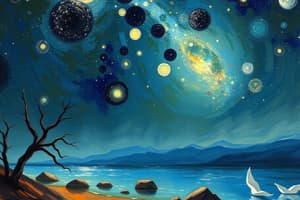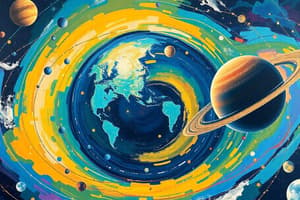Podcast
Questions and Answers
What is the term used to describe the ability of minerals to reflect light?
What is the term used to describe the ability of minerals to reflect light?
- Streak
- Hardness
- Density
- Luster (correct)
Which layer of the atmosphere contains most of the ozone?
Which layer of the atmosphere contains most of the ozone?
- Exosphere
- Mesosphere
- Stratosphere (correct)
- Troposphere
What are the two categories of planets?
What are the two categories of planets?
- Small and Large
- Inner and Outer
- Terrestrial and Jovian (correct)
- Rocky and Gassy
Which stage follows 'Bigbang Nucleosynthesis' in the stages of the Big Bang?
Which stage follows 'Bigbang Nucleosynthesis' in the stages of the Big Bang?
What best describes the hydrological order?
What best describes the hydrological order?
What is the main characteristic of oceanic crust?
What is the main characteristic of oceanic crust?
Who is known as the Father of the Big Bang Theory?
Who is known as the Father of the Big Bang Theory?
What does the term 'streak' refer to in mineral identification?
What does the term 'streak' refer to in mineral identification?
What defines a subsystem in the context of Earth science?
What defines a subsystem in the context of Earth science?
Which term describes the process of changing liquid water to gaseous water?
Which term describes the process of changing liquid water to gaseous water?
Flashcards are hidden until you start studying
Study Notes
Key Concepts in Earth Science
-
Cycle: A sequence of events that recur in the same order, essential for understanding various Earth systems.
-
Luster: A mineral's ability to reflect light, an important characteristic for identifying minerals.
-
Subsystem: A self-contained system operating within a larger system, crucial in ecological and geological contexts.
Atmospheric and Astronomical Insights
-
Atmosphere: Consists of layers of gases surrounding a planet, vital for sustaining life.
-
Astronomy: The branch of science dedicated to studying the universe's origins and evolution.
-
Georges Lemaître: Recognized as the "Father of the Big Bang Theory", which addresses the universe's inception.
-
Big Bang: A theory developed by Lemaître that explains the origin of the universe.
Cosmological and Geological Features
-
Mbombo/Bumba: A deity who experienced severe stomach pain, reflecting mythological concepts of creation.
-
Stratosphere: The atmospheric layer containing the majority of the Earth's ozone, protecting against UV radiation.
-
Hydrological Cycle: The continuous movement of water through the Earth and atmosphere, crucial for climate and ecosystem function.
-
Evaporation: A key process in the water cycle that converts liquid water into vapor.
Age and Composition of the Universe
-
Age of the Universe: Estimated to be approximately 13.8 billion years, providing context for cosmic events and formations.
-
Hardness: Refers to the scratch resistance of minerals, an important factor in mineral identification.
Stages of the Big Bang
- Stages of the Big Bang:
- Singularity
- Big Bang
- Inflation
- Big Bang Nucleosynthesis
- Recombination
Crust Composition and Planet Types
-
Geosphere: Encompasses the rocks and minerals making up Earth, fundamental to understanding geological processes.
-
Continental Crust: Comprises dry land, primarily composed of granite, and is less dense than oceanic crust.
-
Oceanic Crust: Forms the ocean floor, consists mainly of basalt, and is thinner than continental crust.
-
Planet Categories:
- Terrestrial Planets: Rocky, solid planets.
- Jovian Planets: Gas giants with thick atmospheres.
Earth's Subsystems
-
Biosphere: Includes all living and non-living entities on Earth, highlighting the importance of ecological interconnections.
-
Streak: The color of a mineral in powdered form, another key identification characteristic.
-
Earth's Subsystems:
- Geosphere
- Atmosphere
- Hydrosphere
- Biosphere
Overview
- Familiarity with these concepts and definitions will facilitate success in assessments related to Earth Science. Good luck!
Studying That Suits You
Use AI to generate personalized quizzes and flashcards to suit your learning preferences.




